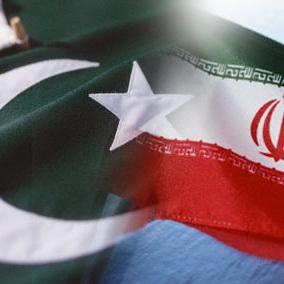 Pakistan and Iran are unlikely to sign currency swap arrangement (CSA), as central banks of both the countries believe that such an option "is not available", officials told�Business Recorder�on Saturday. The sources said that because of international sanctions on Iran, Pakistani banks were hesitant to conduct transactions with Iranian banks and most of trade activities were either carried out in cash or via third country, particularly Dubai.
Pakistan and Iran are unlikely to sign currency swap arrangement (CSA), as central banks of both the countries believe that such an option "is not available", officials told�Business Recorder�on Saturday. The sources said that because of international sanctions on Iran, Pakistani banks were hesitant to conduct transactions with Iranian banks and most of trade activities were either carried out in cash or via third country, particularly Dubai.The matter was taken up by the Commerce Ministry with the State Bank of Pakistan (SBP). In response, the SBP informed that a mechanism was being developed under which the Iranian banks not under sanctions would be able to establish banking relationships with banks in Pakistan. The sources said that Pakistan had been agitating over high tariffs imposed by Iran on Pakistani exports in violation of Preferential Trade Agreement (PTA).
These issues were scheduled to be discussed with Iranian authorities during the visit of President Asif Ali Zardari on December 7, but it was cancelled hours prior to his departure. No official version has been given by the Foreign Office so far on this saga.
However, there are speculations in the federal capital that the President's visit has been cancelled after successful visit of Finance Minister to the United States as the latter made some new commitments. Counting the reasons of deterioration in trade between the two neighbouring countries, the sources said that rice exports to Iran peaked to $335.219 million in 2008-09 but subsequently declined to $97.091 million in 2009-2010 and further to $81.401 million in 2001-12.
The major cause of the decline in rice exports to Iran were sanction imposed by UN and devaluation of Iranian currency and other payment issues. Iran was not yet a member of World Trade Organisation (WTO) which meant that it had no binding on its tariff and was free to increase them to any level. Iran maintains high tariffs on products of export interest to Pakistan. On textiles and clothing, Iranian tariffs are as high as 120 per cent and 100 per cent, respectively.
Similarly, on leather and footwear, Iranian maximum tariffs are 120 per cent, on fruits and vegetables 200 per cent, and on rice 100 per cent, the sources added. "These high tariffs are serious obstacles to Pakistan market access to Iran. Iran also maintains a permit system for imports. When the Iranian government wants to restrict imports, it simply stops processing the permits," the sources added.
Pakistan and Iran have a bilateral PTA which is effective since September 1, 2006 and under the PTA, Pakistan has granted tariff concessions to Iran on 338 tariff lines while Iran extended tariff concessions to Pakistan on 309 tariff lines. Average tariff concessions are around 18 per cent. However, due to Iran's restrictive tariff regime tariffs applied by Iran on Pakistani exports are much higher than tariffs on Iranian exports to Pakistan. Due to Iran's high tariffs as well as limited product coverage substantial increase in bilateral trade has not come through in the wake of Pak-Iran PTA.
Iran even raises tariffs on the products included in Pak-Iran PTA in violation of the agreement. For instance kinnows are included in the PTA and Iran has bound its tariff with Pakistan at 43.5 per cent. However, recently Iran increased tariffs on Kinnows to 90 per cent, the sources continued. The source said high tariffs applied by Iran have contributed to cross border smuggling which creates law and order problem in politically sensitive areas. The matter was taken up by the Secretary Commerce with Iranian delegation during the visit of Iran's Deputy President to Islamabad on February 6-7 this year.
According to Iranian system, all importers are required to first register their requests for imports with the Ministry of Commerce through a system called Sbt-e-Safaresh. After processing of the case, the Ministry of Commerce issues an import permit which is valid for six months. In some cases, the issuance of import permit also requires NoC from other ministries/ departments. The procedure makes it mandatory for all applicants of business visas to get certain medical test reports from specific laboratories. It also necessitates repeated personal presence of the applicant. This constitutes a classic example of a non tariff barrier.
Iranian authorities are charging visa fee from Pakistani drivers and business community at Rs 13,750 as compared to Pakistani visa fee of Rs 2,750. The visa fee is for six months and visa could be cancelled any time by Iranian authorities without assigning any reason.
Iranian government charges a dollar for every three kilometers beyond Zahidan to any other city from Pakistani vehicles as road tax whereas no such tax is levied by Pakistani authorities on the Iranian vehicles which enter Pakistan. Iranian government also charges 10 per cent as carriage fare from Pakistani vehicles whereas no such tax is charged by Pakistani authorities on the load of Iranian vehicles.
Pakistan and Iran have institutional arrangements in the shape of Joint Trade Commission and Joint Economic Commission. However, in addition to these institutional arrangements, high level political intervention might be needed to sensitise top Iranian leadership about Iran's restrictive trade regime. Import of kinnows/mangoes by Iran should be on air conditioned trailers only. If trailers are not available due to large quantity of fruits, the consignments are held up by Iranian authorities. Iranian gate at Mirjaveh is closed at 2pm and transporters are not allowed to cross the border. On the other hand Pakistani gates remain open 24 hours and even on holidays.
By Business Recorder
The Iran Project is not responsible for the content of quoted articles.











